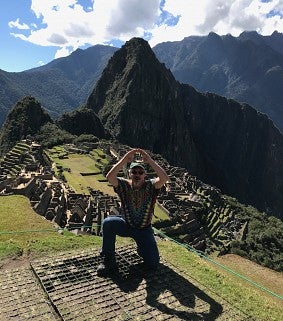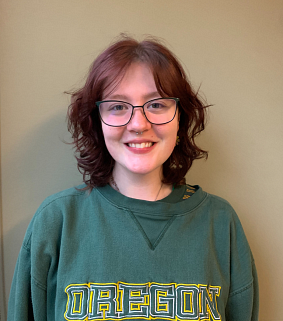FIG Faculty: Spike Gildea
My name is Spike Gildea and my pronouns are he/him/his. I grew up in Vida, Oregon, about 30 miles northeast of Eugene. I have been a Duck since before I was born: my grandma and mom both got their degrees from the UO, my little sister did, too, and my son is currently studying at the UO. Also, I married another Duck (who has a brother, a sister, and a brother-in-law that got degrees from the UO). So after getting all three of my degrees at the UO, my family and I spent eight years in the wilderness (two in Belém, Brazil, at the south bank of the mouth of the Amazon, then another 6 at Rice University in Houston, Texas). In 2000 I felt like I won the lottery when I got to come back to the UO as a professor and Head of the department where I got my last two degrees. For additional pleasure, I play guitar and sing, cook (mostly curries, meats and vegetables), and I do a lot of work building new things at our house, especially for our garden. Also, I need to get out in nature on a regular basis, with camping trips up the McKenzie every summer. As a linguist, I do descriptive and historical linguistics in South America. My work means I goes to the homes of people who speak under-described minoritized languages, ask them to become teachers and work with me to learn about their languages, then I write articles and books for other linguists about the cool patterns I find in their languages. Most of my published research is about description and reconstruction of historical change in the grammar of languages of the Cariban family of South America, which is spoken mostly north of the Amazon in Brazil, the three Guianas, and Venezuela.
But really, none of this bio information has a lot to do with our FIG, does it? Something I had to face early on in my career is that not a lot of students think it’s fun to figure out how to break apart words in remote Amazonian languages. In 2007, I started to create a more general class about language in everyone’s world. I remembered what it was like to come to Eugene from a small country school (McKenzie, in Blue River), and especially what it was like to discover that so much of what I had been taught about English (which I thought then was pretty much all of language) was false. In reality, what I had been taught was more a reflection of societal bias than it was a description of any external “truth” about language. This experience led me to create Language and Power, where I could help students to explore the ways society imposes ideology and stereotypes on our experience of language and communication. An improved version of that class — taught this fall by award-winning professor Melissa Baese-Berk — is half of this FIG. The other half of this FIG is a language-focused section of Writing 121, taught by another colleague I have known for years, Carolyn Bergquist. This FIG will explore connections between the themes from these two classes. But more important to me is that this FIG will be a community, in which all of us will have the chance to get to know each other, ourselves, and the university better. This is my 11th time doing a FIG and I am excited to meet you!
Email:spike@uoregon.edu

